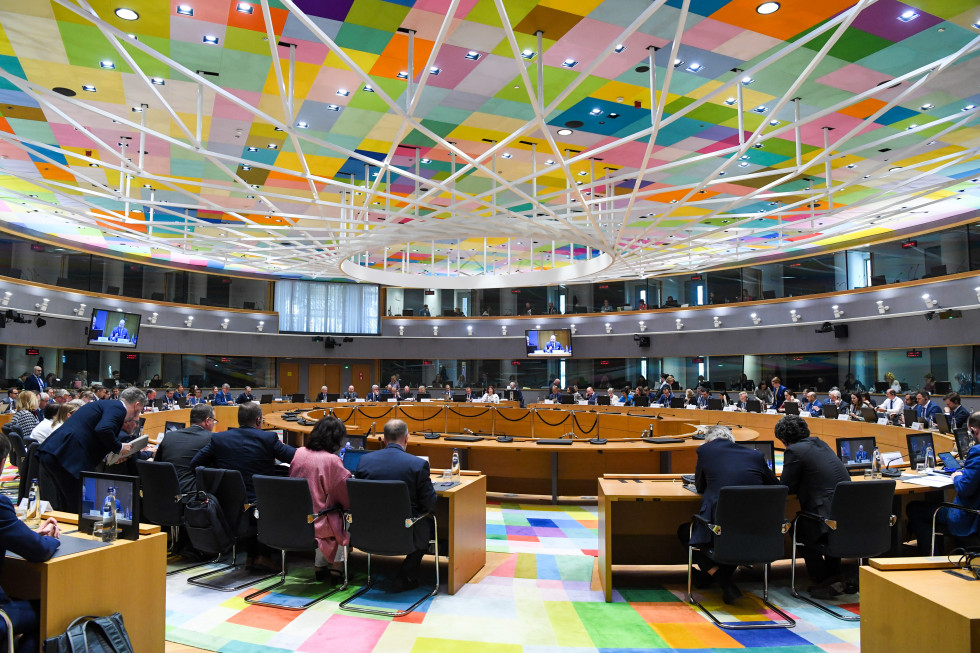EU agriculture ministers on the situation of the market for agricultural products following the war in Ukraine

Agriculture and fisheries council meeting. | Author Svet Evropske unije.
Agricultural items were on the agenda of May's Council. In the first part of the meeting, the presidency provided information on the food safety and food waste aspects of the proposed regulation on packaging and packaging waste. The general goals of the legislative proposals are to reduce the negative impacts of packaging and packaging waste on the environment and to improve the functioning of the single market. Minister Irena Šinko expressed her support for the modernisation of the legislative proposal and Slovenia's support for establishing circular economy, preserving the environment and achieving climate goals. In this context, it is vital to take care of human and animal health. "We should bear in mind that food packaging aims to protect food, which should be hygienic, with good organoleptic properties and safe." She highlighted the possibility of increasing the administrative burden for administrative authorities and producers, who will have to adapt to this.
The Croatian delegation recalled the need to regulate the maximum shelf life of frozen products at the EU level. The legislation on food hygiene stipulates that, with regard to frozen food of animal origin, operators should provide downstream food business operators with the date of production and the date of freezing, if different from the date of production. However, the shelf life for frozen meat is not laid down and is determined by each particular operator. In practice, there are products in the market with a shelf life of several years. Therefore, we should harmonise the provisions in this area and set uniform rules on the maximum shelf life for frozen meat in the market. Minister Irena Šinko highlighted electronic reporting systems as one of the possible solutions. "Such solutions would be a step toward a simple, user-friendly and cost-efficient tool for all players in the value chain, including food business operators, also in the field of marketing frozen products in the EU." The first part of the meeting finished with the report by the European Commission on the 5th European Union–African Union summit.
In the second part of the meeting, the ministers discussed the market situation, in particular following the war in Ukraine. The Ukrainian Minister for Agrarian Policy and Food, Mykola Solskyi, joined the ministers for a working lunch. Minister Solskyi also took the floor at the meeting to present the problems faced by Ukraine and the share of Ukrainian products in EU markets. The European Commission went on to provide information on market situation and proposals for action. The Croatian minister presented the initiative to help member states face numerous future crises in the long-term. Numerous member states highlighted the issues in various agricultural sectors, such as fruit and vegetable sectors and the livestock sector, which do not occur only in sectors for which the measures have been adopted. The extraordinary situation in many sectors is due to adverse weather conditions in previous years and during this year. Minister Šinko stressed that the small size of the Slovenian market makes it very vulnerable to secondary effects of surpluses in the EU market and market fluctuation. "Current estimates show that the cereal sector faces the biggest problems, in particular the wheat sector. These problems include a drop in buying-in prices, full warehouses and high input costs. We are particularly worried about the buying-in prices at the time of the harvest and how to ensure an appropriate buying-in of wheat." She noted that Slovenia was in favour of adopting the third package of measures at the EU level and the use of the remaining funds from the agricultural reserve, but that members states should be able to choose the sectors and have the possibility of co-financing. Minister Šinko supported the Croatian delegation, calling for a better CAP system for managing risks and crises.
At the initiative of the Portuguese delegation, ministers discussed adverse climate conditions in several European countries. "Extreme weather, such as frost, high precipitation and strong wind, already affects this year's crops and permanent crops." Minister added that we are still collecting more detailed information on the damage from adverse weather.

